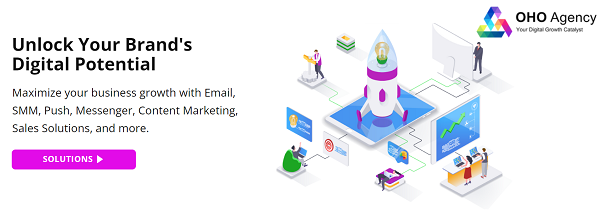Beyond Words. Discover the Power of Content Marketing
Content marketing encompasses various formats and strategies, allowing businesses to tailor their approach to their specific goals and target audience. Content marketing is a trust-building tool that provides valuable information and insights to the audience. When businesses consistently deliver high-quality content that addresses the needs and concerns of their target audience, they establish themselves as authorities in their respective industries. This trust and credibility are pivotal in converting potential customers into loyal patrons.
Types of Content Marketing
The importance of different types of content marketing varies depending on the nature of the company, industry, and the target audience’s preferences. Here are some key types of content marketing that are often considered essential for businesses:
Blog Posts:
- Blogging is a versatile and effective way to provide valuable information, address customer concerns, and boost SEO. Regular blog posts showcase expertise and keep the audience engaged.
Social Media Content:
- Social media platforms are powerful channels for brand promotion and engagement. Visual content, short-form posts, and multimedia content can help businesses connect with their audience, build brand personality, and drive traffic to their website.
Video Content:
- Video is a highly engaging and shareable format. It’s suitable for various platforms, from YouTube to social media. Businesses can use video content for product demonstrations, tutorials, brand storytelling, and more.
Infographics:
- Infographics present information in a visually appealing and digestible format. They are ideal for conveying complex data and statistics in an easy-to-understand manner, making them shareable and memorable.
Podcasts:
- Podcasts have gained popularity, offering businesses a platform to share industry insights, interview experts, and intimately connect with their audience. They are particularly effective for reaching audiences on the go.
Ebooks and Whitepapers:
- Long-form content like ebooks and whitepapers allows businesses to delve deeper into a topic. They are valuable for lead generation, showcasing expertise, and establishing authority within the industry.
Email Marketing:
- Email marketing is a direct and personalized way to communicate with the audience. Newsletters, product updates, and exclusive content can be delivered to subscribers, fostering customer loyalty.
Webinars and Online Events:
- Hosting webinars and online events allows businesses to interact with their audience in real-time. It’s an effective way to showcase products, answer questions, and build community.
User-Generated Content (UGC):
- Encouraging customers to create content related to the brand, such as reviews, testimonials, and social media posts, can enhance credibility and authenticity.
Interactive Content:
- Quizzes, polls, surveys, and interactive experiences can increase engagement and give businesses valuable insights into customer preferences and behavior.
Case Studies:
- Case studies showcase real-world examples of a business’s success in solving customer problems. They serve as powerful testimonials and contribute to building trust.
Influencer Collaborations:
- Partnering with influencers in the industry can help businesses expand their reach and tap into new audiences. Influencers can create content that resonates with their followers, endorsing products or services.
Content Marketing Agencies
Nowadays, businesses are navigating a sea of information and seeking innovative strategies to stand out, connect with their audience, and drive growth. Content marketing has emerged as a powerful tool in this endeavor. Still, for many businesses, the question remains: Should they manage their content marketing in-house or enlist the expertise of a professional agency?
Opting for a content marketing agency like OHO! Agency offers many benefits, transforming how businesses approach and execute digital marketing strategies. By outsourcing content marketing efforts, businesses can tap into a wealth of experience, creativity, and strategic thinking that can propel them to new heights.

One of the primary advantages lies in the wealth of expertise that content marketing agencies bring. These agencies comprise seasoned professionals who have honed their skills through diverse industry experiences. This breadth of knowledge allows them to craft strategies that are both creative and rooted in a deep understanding of market trends, consumer behavior, and the intricacies of effective communication.
Professional agencies are well-versed in the art of storytelling. Content marketing is not merely about creating promotional materials; it’s about telling a compelling story that resonates with the target audience. Agencies excel in crafting narratives that capture attention, evoke emotions, and build lasting connections between brands and their customers.
Moreover, content marketing agencies have the latest tools and technologies to optimize their strategies. From data analytics to SEO tools, agencies leverage a robust tech stack to refine and enhance their content, ensuring it reaches the right audience at the right time. This tech-savvy approach is precious in an era where the digital landscape constantly evolves.
Collaborating with a content marketing agency also provides businesses with the agility to adapt to changing trends and consumer preferences. Agencies stay abreast of industry shifts, algorithm updates, and emerging platforms, allowing companies to stay ahead of the curve without diverting internal resources from their core operations.
Outsourcing content marketing to a professional agency is also a cost-effective solution. While hiring and training an in-house team might incur significant expenses, agencies offer a scalable model where businesses pay for the services they need when they need them. This flexibility is especially advantageous for businesses operating in dynamic markets.
Furthermore, the holistic approach of content marketing agencies extends beyond mere content creation. These agencies can handle end-to-end content strategies, encompassing content creation, distribution, and performance analysis. This comprehensive approach ensures that every content aligns seamlessly with the overarching marketing goals, resulting in a cohesive and impactful brand narrative.
Conclusion
Ultimately, the most effective content marketing strategy for a business involves a thoughtful combination of these types, tailored to the specific needs and preferences of the target audience. Regularly analyzing the performance of different content types and adjusting the strategy is key to maximizing the impact of content marketing efforts.
Leveraging the services of a content marketing agency is more than a practical decision; it is a strategic investment in a brand’s digital success. From harnessing expert knowledge and storytelling prowess to staying technologically adept and adaptable, agencies bring a wealth of advantages to businesses seeking to establish a meaningful and resonant presence in the digital realm. As the digital landscape continues to evolve, partnering with a content marketing agency is an investment that promises visibility, sustained growth, and engagement.




